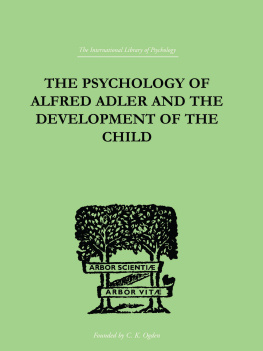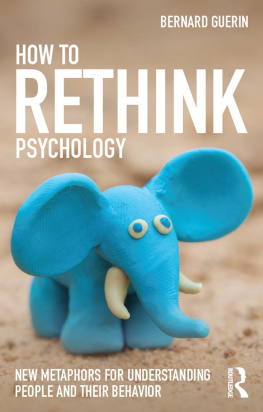B IBLIOGRAPHY
BOOKS BY ALFRED ADLER
The Case of Miss R: The Interpretation of a Life Story. New York: Greenberg, 1929
The Education of Children. Chicago: Regnery Gateway Ed, 1970
The Neurotic Constitution. New York: Amo Press, 1974
The Pattern of Life. New York: Rinehart & Co, 1930
The Practice and Theory of Individual Psychology. New York: Harcourt, Brace & Co, 1927
Problems of Neurosis: A book of case histories. New York: Harper Torchbooks, 1964
Social Interest. Oxford: Oneworld Publications, 1998
What Life Could Mean to You. Oxford: Oneworld Publications, 1998
Understanding Life. Oxford: Oneworld Publications, 1997
BOOKS ABOUT ALFRED ADLER AND HIS WORK
H. L. & Rowena R. Ansbacher (eds). The Individual Psychology of Alfred Adler: A systematic presentation in selection from his writings. New York: Harper Torchbooks, 1964
P. Bottome. Alfred Adler: A Portrait from Life. New York: Vanguard, 1957
D. C. Dinkmeyer, D. C. Dinkmeyer, Jr., & L. Sperry. Adlerian Counseling and Psychotherapy. Columbus: Merrill Publishing Company, 1987
R. Dreikurs. Fundamentals of Adlerian Psychology. Chicago: Adler School, 1953
B. Handlbauer. The FreudAdler Controversy. Oxford: Oneworld Publications, 1998
G. Manaster & R. Corsini. Individual Psychology: Theory and Practice. Chicago: Adler School, 1982
H. Orgler. Alfred Adler: The Man and His Work. New York: Capricorn Books, 1965
1
W HAT IS THE P SYCHE ?
THE CONCEPT OF CONSCIOUSNESS
We attribute a consciousness only to moving, living organisms. The existence of consciousness presupposes free motion, since those organisms that are strongly rooted in one spot have no necessity for it. How unnatural it would be to attribute emotions and thoughts to an oak tree; to contend that the tree might consciously accept the destruction that it could in no way escape; to claim for it a presentiment of that destruction; to attribute reason and free will to it, knowing it could never make use of these qualities. Under such conditions the will and the reason of the oak tree would of necessity remain stillborn.
There is a strict corollary between movement and consciousness. This constitutes the difference between plant and animal. In the evolution of the psyche, therefore, we must consider everything that is connected with movement. All the questions connected with physical movement force the psyche to look ahead, to gather experiences and develop a memory, to equip itself more fully for the business of life. We can thus ascertain from the very beginning that the development of the psyche is connected with movement, and that the evolution and progress of all psychological phenomena are conditioned by the mobility of the organism. This mobility stimulates, promotes and requires an ever greater intensification of mental activity. Imagine individuals who have had every movement planned for them: their mental life will be at a standstill.
THE FUNCTION OF THE PSYCHE
If we regard the function of the psyche from this point of view, we will realize that we are considering the evolution of a hereditary ability, an organ for attack and defence with which the living organism reacts to the situation in which it finds itself. Psychological activity is a complex of aggressive and defensive mechanisms whose final purpose is to guarantee the continued existence of the organism and to enable it to develop in safety. If we accept this premise, then further considerations grow out of it, which we deem necessary for a true conception of the psyche. We cannot imagine psychological activity in isolation. We can only imagine it in relation to its environment, receiving and responding to stimuli from outside.
This premise suggests many considerations about the peculiarities of human beings, their physical nature, their good and bad qualities. These are entirely relative concepts, since there are no objective criteria for judging whether an ability or a physical characteristic is an asset or a liability. These judgements are only relevant to the situation in which individuals find themselves. It is common knowledge that the human foot is, in a sense, a degenerate hand. In an animal that had to climb trees, a human foot would be a definite disadvantage, but for a human being who must walk on flat ground, a foot is so useful that no one would prefer to walk on a normal hand rather than a degenerate foot. It is a fact that in our personal lives, as in the lives of other people, apparent defects should not be considered the source of evil in themselves. Only the context can determine whether they are assets or liabilities.
OUR PURPOSE AND GOAL-DIRECTEDNESS
The first thing we can discover about ourselves is that we are always striving towards a goal. We cannot, therefore, imagine the human spirit as a single, static entity. We can best imagine it as a collection of moving parts, developed from a common origin, which strive to achieve a single goal. This teleology, this striving for a goal, is basic to the concept of adaptation, and the life of the psyche is inconceivable without a goal towards which all our efforts are directed.
Our mental life is determined by our goal. No human being can think, feel, wish or dream without all these activities being determined, continued, modified and directed towards an ever-present objective. This results from the necessity for the organism to adapt itself and respond to the environment. The physical and psychological phenomena of human life are based upon the fundamental principles we have demonstrated. It is impossible to conceive of psychological development except within a pattern depending on an ever-present objective, which is determined in turn by the dynamics of life. The goal itself we may conceive either as changing or as static. On this basis, all the phenomena of our psychological existence may be considered as preparations for some future situation. The soul, indeed, seems to consist chiefly of a force moving towards a goal, and Individual Psychology considers all the manifestations of the human spirit as though they were directed towards such a goal.
Knowing the goal of individuals and knowing also something of the world, enables us to understand the meaning of the ways they express themselves, and of the direction their life takes, and how these things function as a preparation for their goal. We also need to know what steps each individual must take to reach their goal just as we can know the trajectory of a stone if we let it fall to earth although people do not follow a fixed, natural law because the ever-present goal is always in flux. If, however, everyone has an ever-present goal, then every psychological tendency must move towards it, as though it were indeed obeying some natural law. A law governing our psychological life does exist, to be sure; but it is not a natural law like the law of gravity; it is a man-made law. To believe there is sufficient evidence to justify our speaking of a natural law of the psyche is to be deceived by appearances. Anyone who believes they have demonstrated the unchangeable and predetermining power of circumstances is playing with loaded dice. After all, if a painter sets out to paint a picture, the world attributes to him all the attitudes appropriate to an individual with that aim in mind. He will do all the usual things, with all the expected results, just as though there were a natural law at work. But is he under any necessity to paint the picture? Given his free will, we must deduce that it is his striving to attain his goal that keeps him putting the paint on the canvas.







